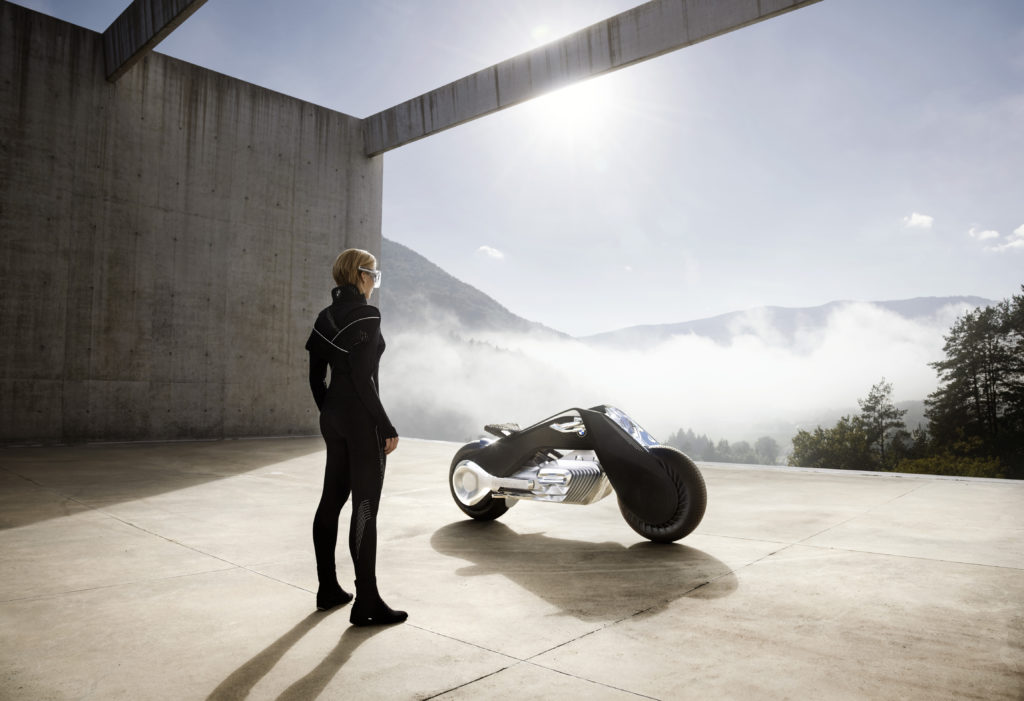We are entering into a new era of BMW, and we have been for some time now. If you recall, this new electrified era centers around BMW’s iNext program, which will result in the delivery of a full 25 model EV lineup by 2023. Even more recently, we learned about the future of iPerformance BMWs with the rumored production of the 545e sedan.
But what about our two-wheeled favorites?
All has been quiet on the Motorrad front until recently, when the internet pounced on BMW’s newest set of patents, which may foreshadow the development of a high-performance electric sport bike. For those that have not yet seen the drawings I’m referring to, prepare to be a little perplexed: The blueprints show a completely frameless design, an aesthetic that most motorcycle enthusiasts aren’t accustomed to seeing.
This radical design isn’t BMW’s first venture into futuristic motifs, however. In 2016, BMW Motorrad debuted an electric motorcycle concept so revolutionary, its very existence felt almost artificial, as if it was the creation of an alternate reality, an adaptation of a virtual universe that had now been manifested into the present. Code-named Vision Next 100, the electric superbike was the brainchild of BMW Motorrad’s head of design, Edgar Heinrich, who developed the bike in accordance with BMW’s imaginary 2130 timeline. Its conception allowed Heinrich and the Motorrad division to explore the possibilities of the future of motorcycle technology that would still deliver a true-to-brand riding experience.
The notion of a “digital companion” was exciting, but it was unclear whether it would be completely autonomous, something that worried a lot of enthusiasts. Holger Hampf, president of California’s DesignworksUSA, assuaged our fear, claiming that, “It was important to us that the analogue riding experience would remain undisturbed. The display and operating concept acts so discreetly that it creates a natural and familiar movement.” The Vision Next 100 offered an accelerated glimpse into the future of Motorrad, but it was just that—a glimpse.
If we look less into the future and more into the present, bypassing concepts reminiscent of Tron: Legacy vehicles, we are left with a single stand-alone example: the Motorrad Vision DC Roadster. At first glance, you can’t deny its artistry; it is innovative, but not smothered with insanely futuristic design cues. To me, the DC Roadster is the perfect unification of the past, present, and future of Motorrad.
Although it sports a much more angular profile, the DC Roadster shares design aspects with BMW’s premier superbike, the S1000 RR. The highly contoured seat and tri-color livery is suspiciously reminiscent of its DOHC inline-four cousin, possibly hinting at a similar performance orientation in the future.
Back in October, BMW patents seemed to indicate that M models may be coming to Motorrad, which would also increase the likelihood of an iPerformance model, should BMW decide to put an all-electric motorcycle into production. But while the S1000 RR reaches world-blurring triple-digit speeds, the DC Roadster’s electric engine and laterally-mounted battery setup limits it to 80 mph. Nevertheless, the DC Roadster’s existence is significant, as it represents one of BMW’s first attempts to compete with other motorcycle manufacturers in the growing electrified-two-wheel market.
The recently released patents seem to indicate that BMW is moving away from concepts and toward reality. Journalists over at Electrek even drew an interesting comparison between the blueprints and BMW’s F800 sport-touring motorcycle, which share a similar “naked” design. Upon second glance, the wheels, suspension linkage, and overall proportions of the bike bear an uncanny resemblance to the patent drawings; this has led many to believe that it may also contain the same level of performance. If this assumption ends up having any weight to it, we may very well be witness to BMW’s first-ever all-electric high-performance motorcycle.
While we are confined to speculation for the time-being, BMW’s entrance into the motorcycle market with a two-wheel electric platform could be a driving force for competitors like Honda, Yamaha, and Harley-Davidson to continue engineering new and competitive high-performance electric motorcycles. Electric mobility is quickly becoming the focus of the future, and these patents are proof that when the time comes, BMW will make sure that we have a choice between four-wheels, or two.—Malia Murphy
[Photos courtesy BMW AG.]
